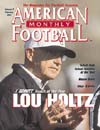AMERICAN FOOTBALL MONTHLY THE #1 RESOURCE FOR FOOTBALL COACHES
Article CategoriesAFM Magazine
|
The Old Dog Has Some New Tricksby: Richard Scott© More from this issue He's 64 years old, he's been a head coach for 29 years, he's won 223 games, taken six different teams to a combined total of 22 bowls, and won a national championship at one of the nation's most prestigious programs. He's the first to admit he's stubborn, sometimes to a fault. He didn't have to change his coaching methods. He didn't have to change his offense or his defense or his staff management style. He didn't have to try anything new. He didn't even have to take this job and put his coaching legacy at risk. But he did, and that goes a long toward explaining why Lou Holtz is American Football Monthly's 2000 Division I-A college coach of the year. "They (awards) mean a lot to me because they're a reflection of the team's success, the assistant coaches, the players," Holtz says. "I'm just a small part of it....The full article can only be seen by subscribers.
|
|
|||||||
| HOME |
MAGAZINE |
SUBSCRIBE | ONLINE COLUMNISTS | COACHING VIDEOS |
Copyright 2026, AmericanFootballMonthly.com
All Rights Reserved





